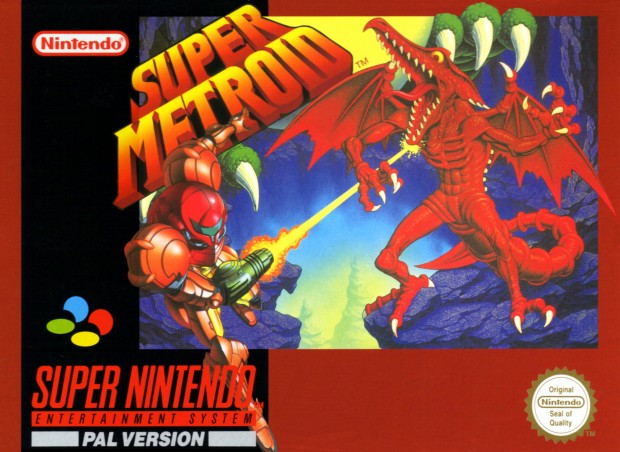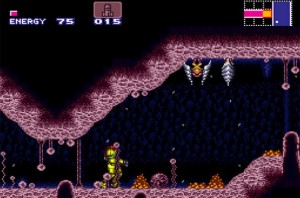 That’s the ultimate goal isn’t it? To create the perfect video game. Very few video games are considered as such, and even then it is of course only opinion. There is no fact in a critic’s verdict, whether it’s print/online. People often forget that, and it is of course the same for you; we’re all critics after all. But there is the matter of consistency to take into account, which is where one of my ‘perfect’ game choices gets a unanimously positive critique/public view: Super Metroid. For those that have played through Yoshio Sakamoto’s action/sci-fi magnum opus, I may be wasting my words on you; but I’m confident you’ll read on to either nod/shake your head at this ‘critic’.
That’s the ultimate goal isn’t it? To create the perfect video game. Very few video games are considered as such, and even then it is of course only opinion. There is no fact in a critic’s verdict, whether it’s print/online. People often forget that, and it is of course the same for you; we’re all critics after all. But there is the matter of consistency to take into account, which is where one of my ‘perfect’ game choices gets a unanimously positive critique/public view: Super Metroid. For those that have played through Yoshio Sakamoto’s action/sci-fi magnum opus, I may be wasting my words on you; but I’m confident you’ll read on to either nod/shake your head at this ‘critic’.
Super Metroid is as perfect as a video game can be. With its super sci-fi intro, a dark atmospheric tone is set from the get-go. This never dissipates but, even more impressively, increases or decreases depending on the location/situation. The elevator ride down to Ridley’s lair is a prime example; I don’t think a 16-bit videogame had ever given me goosebumps before. The crisp, fluent visuals complement the soundtrack perfectly, and of course vice versa, the soundtrack often giving the perfect nod of anticipation for the next section. A great example of this is the descent into Brinstar; it fades in superbly, and sets the tone for the action packed section up ahead.
 Then there is the learning curve; which is seamless in its execution. It’s no different to previous games in the series in that you start with a simple blaster, but the aforementioned visuals and power of the SNES not only leaves enough subtle hints, but also develops the mind-set that success is dependent upon. Add to that the perfect pacing, an average play through of roughly 10 hours first time around, which might not sound like much, but like many a Nintendo classic, it’s highly likely you’ll return for at least a second run through. Add icing to the cake in the form of one of the best and most memorable video game endings ever, and you have an instant classic.
Then there is the learning curve; which is seamless in its execution. It’s no different to previous games in the series in that you start with a simple blaster, but the aforementioned visuals and power of the SNES not only leaves enough subtle hints, but also develops the mind-set that success is dependent upon. Add to that the perfect pacing, an average play through of roughly 10 hours first time around, which might not sound like much, but like many a Nintendo classic, it’s highly likely you’ll return for at least a second run through. Add icing to the cake in the form of one of the best and most memorable video game endings ever, and you have an instant classic.
Now I’m sure you’ve heard all this before, in some form or another. But I believe Super Metroid is not a perfect video game just for its vision, production and execution, but more than that. Back in 1994 when it was originally released, I was 13 years old. Video Games were already a big part of my life, and had been for 8 years, and games such as Super Metroid only served as a positive aid to my lateral thinking, evaluation, puzzle solving, and general acumen.
Over 20 years on, it not only stands the test of time, but has indeed got better with age. Super Metroid is not just technically brilliant, but still technically brilliant, even to this day. And with the beauty of virtual console, it is already being passed on to further generations. That, for me, is perfection.
Super Metroid is as perfect as a video game can be. With its super sci-fi intro, a dark atmospheric tone is set from the get-go. This never dissipates but, even more impressively, increases or decreases depending on the location/situation. The elevator ride down to Ridley’s lair is a prime example; I don’t think a 16-bit videogame had ever given me goosebumps before. The crisp, fluent visuals complement the soundtrack perfectly, and of course vice versa, the soundtrack often giving the perfect nod of anticipation for the next section. A great example of this is the descent into Brinstar; it fades in superbly, and sets the tone for the action packed section up ahead.
Now I’m sure you’ve heard all this before, in some form or another. But I believe Super Metroid is not a perfect video game just for its vision, production and execution, but more than that. Back in 1994 when it was originally released, I was 13 years old. Video Games were already a big part of my life, and had been for 8 years, and games such as Super Metroid only served as a positive aid to my lateral thinking, evaluation, puzzle solving, and general acumen.
Over 20 years on, it not only stands the test of time, but has indeed got better with age. Super Metroid is not just technically brilliant, but still technically brilliant, even to this day. And with the beauty of virtual console, it is already being passed on to further generations. That, for me, is perfection.
Share this: